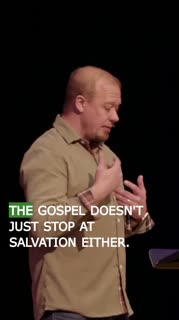Transformative Discipleship: Aligning Desires with God's Will
Devotional
Sermon Summary
Bible Study Guide
Sermon Clips
"Transformation, however, here's what takes place. It's not just the modifying of a behavior. What transformation is, it's this shift of change. It's a change of a desire. It's a changing of desire, right? It's changing of the desire that was drawing you to that behavior. That's transformation." [00:10:25] (17 seconds)
"And so the distinction of the follower of Jesus, it's not that behaviors have just been modified or adjusted. The distinction for the follower of Jesus is that there is transformation. And that flows from the only source that has the power to actually transform. Christ Jesus himself." [00:10:42] (20 seconds)
"Transformation is based out of the power of Christ working in us, Christ working through us. The foundation is Christ. That's what this Christology term refers to, is our understanding of Christ." [00:14:00] (15 seconds)
"Living a moral life, that's not what distinguishes a disciple of Jesus. Living a moral life, yes, that's a response to what Jesus has done. But Peter claims that pretty well here, this reality of like relative morality is possible without Christ, but blamelessness, this true moral God standard, it's not." [00:21:49] (19 seconds)
"Transformed lives, the distinction of a disciple exhibits, above all things, love. Now, this is something Peter actually heard directly from Jesus. Look at John 13, 35. By this, everyone will know that you are my disciples if you love one another." [00:32:29] (19 seconds)
"Hospitality shouldn't be a barter system. It shouldn't be a barter system. be like looking for some sort of trade. It's a sacrificial action, and Peter says we should do this without grumbling. Why? Well, because Jesus welcomed those who were messy, those who were unable to give the same level of value in return, and he offers them rescue, and he offers them a home." [00:38:30] (31 seconds)
"The gospel doesn't just stop at salvation either. The gospel is what continues to transform us day after day after day until Christ returns or until he calls us home. But until that time, here's the identifying factor of a disciple of Jesus." [00:43:14] (20 seconds)
Ask a question about this sermon
"And so the distinction of the follower of Jesus, it's not that behaviors have just been modified or adjusted. The distinction for the follower of Jesus is that there is transformation. And that flows from the only source that has the power to actually transform. Christ Jesus himself." [00:10:42] (20 seconds)
"Transformation is based out of the power of Christ working in us, Christ working through us. The foundation is Christ. That's what this Christology term refers to, is our understanding of Christ." [00:14:00] (15 seconds)
"Living a moral life, that's not what distinguishes a disciple of Jesus. Living a moral life, yes, that's a response to what Jesus has done. But Peter claims that pretty well here, this reality of like relative morality is possible without Christ, but blamelessness, this true moral God standard, it's not." [00:21:49] (19 seconds)
"Transformed lives, the distinction of a disciple exhibits, above all things, love. Now, this is something Peter actually heard directly from Jesus. Look at John 13, 35. By this, everyone will know that you are my disciples if you love one another." [00:32:29] (19 seconds)
"Hospitality shouldn't be a barter system. It shouldn't be a barter system. be like looking for some sort of trade. It's a sacrificial action, and Peter says we should do this without grumbling. Why? Well, because Jesus welcomed those who were messy, those who were unable to give the same level of value in return, and he offers them rescue, and he offers them a home." [00:38:30] (31 seconds)
"The gospel doesn't just stop at salvation either. The gospel is what continues to transform us day after day after day until Christ returns or until he calls us home. But until that time, here's the identifying factor of a disciple of Jesus." [00:43:14] (20 seconds)














